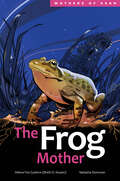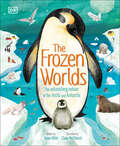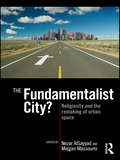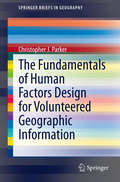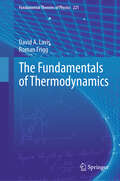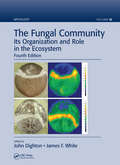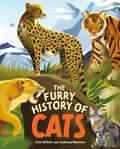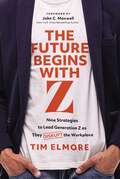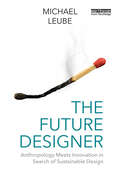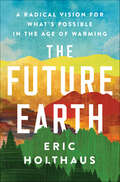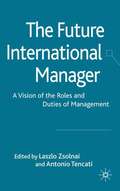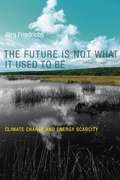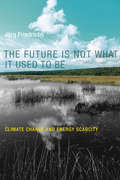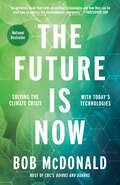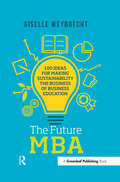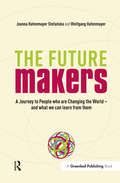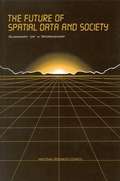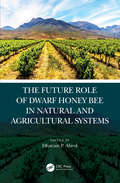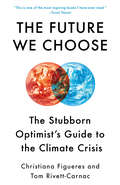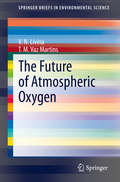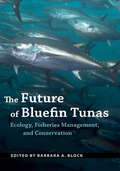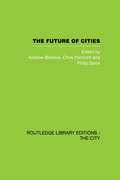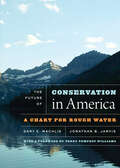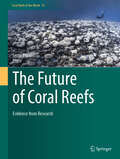- Table View
- List View
The Frog Mother (Mothers of Xsan)
by Hetxw’ms Gyetxw HusonTo the Gitxsan of Northwestern British Columbia, Nox Ga&’naaw is a storyteller, speaking truths of the universe. After Nox Ga&’naaw, the frog mother, releases her eggs among the aquatic plants of a pond, the tiny tadpoles are left to fend for themselves. As they hatch, grow legs, and transform into their adult selves, they must avoid the mouths of hungry predators. Will the young frogs survive to spawn their own eggs, continuing a cycle 200 million years in the making?Book four of the Mothers of Xsan series follows the life cycle of the columbia spotted frog. Learn about why this species is of special significance to the Gitxsan and how Nox Ga'naaw and her offspring are essential to the balance that is life.
The Frozen Worlds: The Astonishing Nature of the Arctic and Antarctic (The Magic and Mystery of the Natural World)
by Jason BittelEnter the world of the Arctic and Antarctic, in this gorgeously illustrated book for young animal and conservation enthusiasts.Polar bears and penguins glide and whales and walruses dive across the pages of this colorful book, which takes children on a fascinating sub-zero journey of the amazing Earth&’s poles.The Frozen Worlds combines stunning illustrations and photos to help young enthusiasts aged 7-9 learn all about the Arctic and Antarctic. From incredible frozen rivers to Antarctic volcanoes, they&’ll discover the incredible secret life of Earth&’s polar regions, as well as which plants and animals live near them, and how they can protect them from the issues facing them today. Children will love finding out all about the different people who live and work here, and how they can help take care of the Arctic and Antarctic themselves.This fascinating book for children features: - Intriguing information about the Arctic and Antarctic, that supports and goes beyond the curriculum!- Factual, fascinating, and fun content - with detailed illustrations and photographs of animals, icebergs, and more.- An engaging mixture of stunning photography and detailed illustrations by Claire McElfatrick.- Exciting and unusual facts convey information about our amazing polar regions.The Frozen Worlds covers a wide range of exciting subjects about the polar regions, from their wildlife to their geography and history, including a multitude of polar life, amazing facts on how icebergs are formed, how animals survive in the freezing cold, and how scientists study the Antarctic. Children with an interest in the Earth&’s icy poles will love reading about the ecosystems, habitats and climates in these fascinating regions.
The Fundamentalist City?: Religiosity and the Remaking of Urban Space
by Nezar AlSayyadThe relationship between urbanism and fundamentalism is a very complex one. This book explores how the dynamics of different forms of religious fundamentalisms are produced, represented, and practiced in the city. It attempts to establish a relationship between two important phenomena: the historic transition of the majority of the world’s population from a rural to an urban existence; and the robust resurgence of religion as a major force in the shaping of contemporary life in many parts of the world. Employing a transnational interrogation anchored in specific geographic regions, the contributors to this volume explore the intellectual and practical challenges posed by fundamentalist groups, movements, and organizations. They focus on how certain ultra religious practices of Christianity, Hinduism, Islam, and Judaism have contributed to the remaking of global urban space. Their work suggests that it is a grave oversimplification to view religious orthodoxies or doctrines as the main cause of urban terrorism or violence. Instead they argue that such phenomena should be understood as a particular manifestation of modernity’s struggles. Nezar AlSayyad and Mejgan Massoumi’s book provides fascinating reading for those interested in religion and the city, with thought provoking pieces from experts in anthropology, geography sociology, religious studies, and urban studies.
The Fundamentals of Atomic and Molecular Physics
by Robert L BrooksThe Fundamentals of Atomic and Molecular Physics is intended as an introduction to the field for advanced undergraduates who have taken quantum mechanics. Each chapter builds upon the previous, using the same tools and methods throughout. As the students progress through the book, their ability to use these tools will steadily increase, along with their confidence in their efficacy. The book treats the two-electron atom as the simplest example of the many-electron atom--as opposed to using techniques that are not applicable to many-electron atoms--so that it is unnecessary to develop additional equations when turning to multielectron atoms, such as carbon. External fields are treated using both perturbation theory and direct diagonalization and spontaneous emission is developed from first principles. Only diatomic molecules are considered with the hydrogen molecular ion and neutral molecule treated in some detail. This comprehensive coverage of the quantum mechanics of complex atoms and simple diatomic molecules, developed from the very basic components, is extremely useful for students considering graduate studies in any area of physics.
The Fundamentals of Human Factors Design for Volunteered Geographic Information
by Christopher J. ParkerThis book explores the roles in which volunteered and professional information play within neogeography from a human factors perspective. The unique advantages of each information type are considered alongside how they may be utilised to create products and services delivering highly functional, efficient and satisfying experiences to their users. The overall aim of this book is to address the issue of how Volunteered Geographic Information (VGI) can be combined with Professional Geographic Information (PGI) to satisfy the information search requirements of consumer-users via highly usable mashups. Firstly, this required the development of an understanding of the way different users perceive VGI and PGI in terms of its benefits to their activities and information needs. Secondly, the benefits that VGI may bring to the user experience of a mashup (which cannot be attained through the use of PGI) needed to be understood. In order to achieve this, a user centred design perspective was implemented throughout the research.
The Fundamentals of Thermodynamics (Fundamental Theories of Physics #221)
by Roman Frigg David A. LavisThe aim of this text is to provide an account of the fundamentals of thermodynamics which is accessible at graduate level to physicists, mathematicians and philosophers of physics. The bulk of the book (Chapters 2-9) is based on the algebraic approach of Lieb and Yngvason, but extended to encompass both positive and negative temperatures and systems in which entropy increases and decreases in adiabatic processes. We show that these four possibilities are already present in Carathéodory's version of the Second Law which arises as a theorem from the axioms. We develop generalized versions of the Kelvin-Planck and Clausius formulations valid for the same range of systems. The parallel development in Chapter 10 takes a geometric approach. We discuss the limitations associated with the local nature of Carathéodory's Principle and present the resolution of this problem due to Boyling. Part of the aim here is to substantiate the claim of Arnold that the mathematical structure of thermodynamics is contact geometry. The last two chapters of the book extend the scope of the discussion to, respectively, critical phenomena and non-equilibrium systems. Chapter 11 is a presentation of phase transitions and critical phenomena in which we discuss universality and use scaling theory to derive scaling laws. Chapter 12 contains a generalization to non-equilibrium. We present the extension of Lieb and Yngvason's work to non-equilibrium and also give a brief account of classical irreversible thermodynamics (CIT). The latter enables a possible understanding of the way that the lack of a unique entropy function in the Lieb and Yngvason non-equilibrium approach can be resolved. The book is completed by a set of appendices which provide mathematical and physical support to the work in the main text.
The Fungal Community: Its Organization and Role in the Ecosystem, Fourth Edition (Mycology)
by James F. White John Dighton"…a number of chapters provide excellent summaries of the modern methods available for studying fungal ecology, along with those more traditional methods that are still extremely valuable…overall it is a hugely valuable compendium of fungal ecology research. It is a must for the library shelf." -Lynne Boddy, Cardiff University, UK, Mycological Research, 2006"These 44 chapters are an excellent starting point for anyone interested in fungal communities, in the broadest sense of the term. It is a book for dipping into…may be the last comprehensive treatment of fungal communities before the molecular revolution."-Meriel Jones, University of Liverpool, UK, Microbiology Today "… the scope of the work is tremendous. … Excellent chapters providing overviews of methods … provide a snap shot of the current approaches used to understand fungal communities at several levels of organization. This book should probably be on the shelf of every student of mycology, and many ecologists too. For all students, this book should be a valuable resource and source of inspiration." -Daniel Henk, Imperial College Faculty of Medicine, London, in Inoculum, Vol. 59, No. 3, May 2008 "Thorough taxonomic and subject indices further aid the reader in navigating through multiple authors’ treatments of subjects of interest." - Anthony Amend, Department of Botany, University of Hawaii at Manoa in Economic Botany, V. 61 In all subjects in science, new findings and the use of new technologies allow us to develop an ever-greater understanding of our world. Expanded and updated coverage in the fourth edition includes: Adds new sections on Integrating Genomics and Metagenomics into Community Analysis, Recent Advances in Fungal Endophyte Research, Fungi in the Built Environment, and Fungal Signaling and Communication Includes a broader treatment of fungal communities in natural ecosystems with in-depth coverage of fungal adaptations to stress and conservation Expands coverage of the influence of climate change on fungi and the role of fungi in organically polluted ecosystems Includes contributions from scientists from 20 nations to illustrate a true global approach for bridging gaps between ecological concepts and mycology
The Furry History of Cats (History of... #2)
by Clive GiffordRoarsome and awesome cats are amongst the most intriguing and much-loved mammals on the planet. With over 40 different species, this book looks at them all, from the smallest, cutest cats to the most powerful cats such as lions, tigers and jaguars.Discover how their fur is important in many different ways. See inside cats to reveal the features that give them their agile movement and hunting prowess. Learn about their paw-fect super senses. Travel back in time to discover the prehistoric sabre-toothed cats. Then discover what you can do to help look after cats at home and in the wild.The colourful and detailed illustrations from Andressa Meissner bring the cats vividly to life. The consultant is the curator of the Big Cat Sanctuary, a UK-based charity established to conserve wild cats globally
The Future Begins with Z: Nine Strategies to Lead Generation Z as They Disrupt the Workplace
by Tim Elmore&“A definitive guide to engaging with members of Gen Z in the workplace.&” —Publishers WeeklyWhat if your greatest challenge could become your greatest solution?Generation Z has entered the workforce and are challenging leaders in ways they have never experienced before. Gen Zers often bring little work experience following college graduation, with parents encouraging them to focus on academics. Plus, having grown up on screens, they frequently bring lower levels of emotional intelligence than previous youth generations.Today, 4 in 5 hiring managers say Generation Z is the most difficult population to manage. Almost one in three avoid hiring them altogether. We cannot walk away from this challenge as these young teammates represent the future. While the boss has visibility on the past, they have visibility on the future. This resource, The Future Begins with Z, offers nine strategies to inspire and connect with the next generation of workers as they transform the workforce. Some of those strategies involve: How to attract and onboard them so they'll want to stay.How to offer firm feedback to a fragile young employee.How to uniquely motivate and incentivize them.How to cultivate full engagement in Gen Z teammates.How to equip them to manage their mental health challenges. If we lead them well, we'll find young professionals often enter their careers with a greater insight into social media and how to monetize it; they seem to understand what young consumers want, and they possess deeper intuition on where culture is going. They are not tied to expectations for how work is done and are more open to new ideas. To succeed, today's leaders will need to listen more and to coach more than we once did. The future is in our hands. Let's make the very most of it.
The Future Designer: Anthropology Meets Innovation in Search of Sustainable Design
by Michael LeubeDuring periods of environmental and societal upheaval, design has the potential to be a formidable catalyst towards a sustainable future. However, to unleash its full power, significant shifts in both theory and practice are imperative. This book adopts a unique approach, blending anthropological perspectives with philosophy and cognitive science, and advocates for a thorough transformation of the existing design curriculum.Supported by a vast body of literature in evolutionary science and design research, the book presents a blueprint for fostering more sustainable patterns of production and consumption. This blueprint is grounded in human virtues rather than vices and proposes a new curriculum tailored towards pro-sociality and sustainability. Leveraging his extensive professional background and expertise in the circular economy, Michael Leube offers practical examples, methods and tools for implementing sustainable approaches in the practical work of experienced designers. Showcasing cutting-edge innovations for pro-social and humanitarian design, the book ultimately argues that if we change the objective of design from creating desire to creating value, we can solve many of the most pressing social problems, from the cooperation of citizens to sustainable cities.The book will be useful for those studying and teaching design and anthropology, and it will also be an important tool for practicing designers and engineers interested in learning how to design for social and ecological awareness.
The Future Earth: A Radical Vision for What's Possible in the Age of Warming
by Eric HolthausThe first hopeful book about climate change, The Future Earth shows readers how to reverse the short- and long-term effects of climate change over the next three decades.The basics of climate science are easy. We know it is entirely human-caused. Which means its solutions will be similarly human-led. In The Future Earth, leading climate change advocate and weather-related journalist Eric Holthaus (“the Rebel Nerd of Meteorology”—Rolling Stone) offers a radical vision of our future, specifically how to reverse the short- and long-term effects of climate change over the next three decades. Anchored by world-class reporting, interviews with futurists, climatologists, biologists, economists, and climate change activists, it shows what the world could look like if we implemented radical solutions on the scale of the crises we face. What could happen if we reduced carbon emissions by 50 percent in the next decade?What could living in a city look like in 2030?How could the world operate in 2040, if the proposed Green New Deal created a 100 percent net carbon-free economy in the United States?This is the book for anyone who feels overwhelmed by the current state of our environment. Hopeful and prophetic, The Future Earth invites us to imagine how we can reverse the effects of climate change in our own lifetime and encourages us to enter a deeper relationship with the earth as conscientious stewards and to re-affirm our commitment to one another in our shared humanity.
The Future International Manager
by Laszlo Zsolnai Antonio TencatiAn in-depth look at the desired professional profile of new international managers in different aspects of business. It examines the qualities an international manager needs to possess, including commitment to environmental sustainability, sensitivity toward gender and diversity issues and an engagement in progressive entrepreneurship.
The Future Is Not What It Used to Be
by Jörg FriedrichsThe future is not what it used to be because we can no longer rely on the comfortingassumption that it will resemble the past. Past abundance of fuel, for example, does not implyunending abundance. Infinite growth on a finite planet is not possible. In thisbook, Jrg Friedrichs argues that industrial society itself is transitory, and he examines theprospects for our civilization's coming to terms with its two most imminent choke points: climatechange and energy scarcity. He offers a thorough and accessible account of these two challenges aswell as the linkages between them. Friedrichs contends that industrialcivilization cannot outlast our ability to burn fossil fuels and that the demise of industrialsociety would entail cataclysmic change, including population decreases. To understand the socialand political implications, he examines historical cases of climate stress and energy scarcity:devastating droughts in the ancient Near East; the Little Ice Age in the medieval Far North; theJapanese struggle to prevent "fuel starvation" from 1918 to 1945; the "totalitarianretrenchment" of the North Korean governing class after the end of Soviet oil deliveries; andCuba's socioeconomic adaptation to fuel scarcity in the 1990s. He draws important lessons about thelikely effects of climate and energy disruptions on different kinds ofsocieties. The warnings of climate scientists are met by denial and inaction,while energy experts offer little guidance on the effects of future scarcity. Friedrichs suggeststhat to confront our predicament we must affirm our core values and take action to transform our wayof life. Whether we are private citizens or public officials, complacency is not an option: climatechange and energy scarcity are emerging facts of life.
The Future Is Not What It Used to Be: Climate Change and Energy Scarcity
by Jorg FriedrichsA hard look at the twin challenges of climate change and energy scarcity that examines historical precedents and allows no room for complacency.The future is not what it used to be because we can no longer rely on the comforting assumption that it will resemble the past. Past abundance of fuel, for example, does not imply unending abundance. Infinite growth on a finite planet is not possible. In this book, Jörg Friedrichs argues that industrial society itself is transitory, and he examines the prospects for our civilization's coming to terms with its two most imminent choke points: climate change and energy scarcity. He offers a thorough and accessible account of these two challenges as well as the linkages between them.Friedrichs contends that industrial civilization cannot outlast our ability to burn fossil fuels and that the demise of industrial society would entail cataclysmic change, including population decreases. To understand the social and political implications, he examines historical cases of climate stress and energy scarcity: devastating droughts in the ancient Near East; the Little Ice Age in the medieval Far North; the Japanese struggle to prevent “fuel starvation” from 1918 to 1945; the “totalitarian retrenchment” of the North Korean governing class after the end of Soviet oil deliveries; and Cuba's socioeconomic adaptation to fuel scarcity in the 1990s. He draws important lessons about the likely effects of climate and energy disruptions on different kinds of societies.The warnings of climate scientists are met by denial and inaction, while energy experts offer little guidance on the effects of future scarcity. Friedrichs suggests that to confront our predicament we must affirm our core values and take action to transform our way of life. Whether we are private citizens or public officials, complacency is not an option: climate change and energy scarcity are emerging facts of life.
The Future Is Now: Solving the Climate Crisis with Today's Technologies
by Bob McDonaldIs a global pandemic what it took to show us that saving our planet is possible?In the absence of motorized boats and gondolas, Venice&’s waters have returned to a sparkling blue color. Deer have been spotted roaming cities in Italy, and mountain goats recently took over a small seaside town in Wales. Taking advantage of the decreased boat traffic, whales have returned to roaming Vancouver&’s harbours. The absence of &“regular&” human activities has dramatically affected our environment. In this book, Bob McDonald turns his focus to global energy sources, and shows how the global shutdowns may have been exactly what we needed to show us that a greener future is achievable. This is not another &“wake-up call,&” and not another plea to heed the climate science. This is an exploration of the incredible technologies that our species can use to get out of the mess we&’ve made for ourselves. It is a work of immense optimism, to counteract the sense of doom that hangs over most discussions of the environment. Many alternative energy sources such as wind, solar, and geothermal have been available for decades—but they alone will not be enough. Additional power will come from small nuclear reactors the size of an office desk, and space-based solar power satellites with enormous mirrors that can capture sunlight, convert it to microwaves, and beam it to the ground to light up entire cities. Energy will be captured from waves, tides, and hydrogen. Vehicles will no longer have tailpipes that emit smog particles. Food will be sourced locally. Green technology is one of the fastest growing sectors of the economy, and will only continue to skyrocket as current products improve their performance and new products emerge. A new green age is upon us--let this book be your guide to the future.
The Future MBA: 100 Ideas for Making Sustainability the Business of Business Education (The Principles for Responsible Management Education Series)
by Giselle WeybrechtThe Future MBA brings together 100 ideas on how to rethink management education in order to embed sustainability. This book acts as a creative toolkit for individuals working in management education on how to design new and innovative products, services, and experiences for the business school community with a focus on sustainability. What if we took a moment to stand back and look at the bigger picture? What would the business school of the future look like? Rather than a roadmap, the 100 ideas presented in this book are meant to be a source of inspiration in responding to these questions. Some ideas could be put into practice tomorrow, some would require a complete reassessment of the way we view business education, and others are meant to encourage more ideas… and more action, to turn management education into a key player in moving the sustainability agenda forward.
The Future Makers: A Journey to People who are Changing the World – and What We Can Learn from Them
by joanna Hafenmayer wolfgang HafenmayerAre you looking for sense and meaning in your work? Would you like to be successful but expect more in the way of reward and fulfilment than just a paycheque? The Future Makers offers 23 encouraging responses to these questions. It tells the diverse stories of people from around the world who have made a sustainable mark on the world through their careers: from an American financial market specialist to tree planters in Africa; from Japanese environmental experts to dancers in Argentina. The Future Makers are people who make the world a better, more beautiful and livable place for current and coming generations. The Hafenmayers present these inspiring stories in an accessible, entertaining and thoughtful way. But they also do far more. The book presents a toolkit on how you can forge a career that has a positive impact on the world. This step-by-step process has already had a life-changing impact on readers of the original German edition. It is packed with helpful suggestions for personal development and reorientation – for a work life that will make you happier and deeply satisfied. The Future Makers takes you on a journey to people whose values and visions aren't compartmentalized into corners of their lives. They live their dreams every day. This book will show you how you can do the same.
The Future Of Spatial Data And Society: Summary Of A Workshop
by Mapping Science CommitteeA report on The Future Of Spatial Data And Society
The Future Role of Dwarf Honey Bees in Natural and Agricultural Systems
by Dharam P. AbrolThe future role of dwarf honeybees in natural and agricultural systems provides multidisciplinary perspective about the different facets of dwarf honeybees. The role of dwarf honeybee Apis florea assumes utmost importance in the context of pollinator decline throughout the world threatening stability of ecosystems and global food security. Apis florea is a low land species of south Asia extending more to the west than other Asiatic Apis species. It is an important pollinator of crops in hot and dry agricultural plains. The book is first of its kind which deals in details on varied aspects of Apis florea biology, management, conservation strategies for protecting biodiversity and enhancing crop productivity. The book aims to promote a large, diverse, sustainable, and dependable bee pollinator workforce that can meet the challenge for optimizing food production well into the 21st century. Features: Apis florea provides source of livelihood in mountainous areas and marginal farmers. This book will for the first time present the beekeeping from the perspective of agricultural production and biodiversity conservation An excellent source of advanced study material for academics, researchers and students and programme planners Excellent pollinator of tropical and subtropical crops fruits vegetables etc less prone to diseases and enemies Covering the latest information on various aspects of Apis florea biology, this book brings the latest advances together in a single volume for researchers and advanced level students This book will be useful to pollination biologists, honeybee biologists in entomology departments, students, teachers, scientists of agriculture, animal behaviour, botany, conservation, biology, ecology, entomology, environmental biology, forestry, genetics, plant breeding, horticulture, toxicology, zoology, seed growers and seed agencies and shall serve as reference book for students, teachers, researchers, extension functionaries and policy planners.
The Future We Choose: Surviving the Climate Crisis
by Christiana Figueres Tom Rivett-CarnacClimate change: it is arguably the most urgent and consequential issue humankind has ever faced. How we address it in the next thirty years will determine the kind of world we will live in and will bequeath to our children and to theirs.In The Future We Choose, Christiana Figueres and Tom Rivett-Carnac--who led negotiations for the United Nations during the historic Paris Agreement of 2015--have written a cautionary but optimistic book about the world's changing climate and the fate of humanity. The authors outline two possible scenarios for our planet. In one, they describe what life on Earth will be like by 2050 if we fail to meet the Paris climate targets. In the other, they lay out what it will be like to live in a carbon neutral, regenerative world. They argue for confronting the climate crisis head-on, with determination and optimism. The Future We Choose presents our options and tells us what governments, corporations, and each of us can and must do to fend off disaster.
The Future of Atmospheric Oxygen (SpringerBriefs in Environmental Science)
by V. N. Livina T. M. Vaz MartinsThis book investigates various aspects of the phenomenon of atmospheric oxygen depletion, and summarizes our current knowledge of atmospheric oxygen. The authors address the currently available records indicating that atmospheric oxygen is undergoing nonlinear decline. The consensus in the research community is that the main reason for this decline is the combustion of fossil fuels (which is growing nonlinearly). However, the short length of the currently available records, alongside the technological and social uncertainties that may risk speed up oxygen depletion, raise questions about the time scale of the decline, in particular, when oxygen depletion may cause physiological impact on humans and animals. The authors analyze this uncertainty to postulate the near term impact of depleted atmospheric oxygen, and perform multidisciplinary complex modelling of oxygen with long-term horizon estimations.
The Future of Bluefin Tunas: Ecology, Fisheries Management, and Conservation
by Barbara A. BlockThe most thorough and current account of scientific research on bluefin tunas—the largest, most sought-after tunas in the worldBluefin tunas are dominant keystone predators known for their impressive size, strength, endurance, and speed. Electronic tags have revealed that they can dive to great depths (over 6000 feet) and migrate vast distances—from frigid subpolar seas to warm tropical waters—for spawning. Prized for their rich taste and unique texture, bluefin tunas are also a worldwide commodity of great value. However, over the past few decades, overfishing throughout their range has led to significant population reductions.In The Future of Bluefin Tunas, Barbara A. Block brings together renowned bluefin experts from 15 different countries to share the latest information on the science, fisheries policy, and management decisions related to each of the three species within the Thunnus group—Atlantic, Pacific, and Southern. Synthesizing basic and applied research, the book delves into every aspect of these majestic fish, from their life history and genetic makeup to their ecology and migrations. Ichthyologists and marine scientists dedicated to the study of these fishes report on the latest stock assessments, explore the results of advances such as biologging and DNA sampling, and assess the potential of bluefin tuna aquaculture.The Future of Bluefin Tunas provides critical research findings to inform decisions that will impact tunas and the ocean ecosystems they affect. Scientists, fisheries managers, policymakers, and marine conservationists will take away key data from this timely volume to help them ensure these remarkable fish continue in perpetuity.
The Future of Cities
by Chris Hamnett Andrew Blowers Philip SarreThis collection of readings draws on material from a wide range of sources - from the past and present and from literature and technology - and is concentrated on the areas which seem most relevant to the planning of the future city - what is happening to the city and what we can do about it. The readings have been selected and organised to present the planning of the future city. This book was first published in 1974.
The Future of Conservation in America: A Chart For Rough Water, With A Foreword By Terry Tempest Williams
by Terry Tempest Williams Gary E. Machlis Jonathan B. JarvisThis is a turbulent time for the conservation of America’s natural and cultural heritage. From the current assaults on environmental protection to the threats of climate change, biodiversity loss, and disparity of environmental justice, the challenges facing the conservation movement are both immediate and long term. In this time of uncertainty, we need a clear and compelling guide for the future of conservation in America, a declaration to inspire the next generation of conservation leaders. This is that guide—what the authors describe as “a chart for rough water.” Written by the first scientist appointed as science advisor to the director of the National Park Service and the eighteenth director of the National Park Service, this is a candid, passionate, and ultimately hopeful book. The authors describe a unified vision of conservation that binds nature protection, historical preservation, sustainability, public health, civil rights and social justice, and science into common cause—and offer real-world strategies for progress. To be read, pondered, debated, and often revisited, The Future of Conservation in America is destined to be a touchstone for the conservation movement in the decades ahead.
The Future of Coral Reefs: Evidence from Research (Coral Reefs of the World #21)
by Serge PlanesThis book provides a comprehensive exploration of coral reefs—among Earth's most diverse yet vulnerable ecosystems—in the context of global climate change and local human pressures. Structured as an interconnected narrative, the volume delves into critical topics such as reef biodiversity, trophic ecology, environmental histories revealed by coral skeletons, and coral nutrition strategies. Central themes include the physiological and ecological responses of corals to thermal stress and ocean acidification, the adaptive mechanisms underpinning coral bleaching, and innovative restoration techniques aimed at reef recovery. Advanced methodologies such as high-resolution remote sensing, environmental DNA (eDNA) monitoring, and geochemical analyses enrich our understanding of these dynamic ecosystems. Importantly, the book bridges natural sciences with human dimensions, exploring historical human–reef interactions and community-based conservation practices. This interdisciplinary approach highlights both scientific innovation and traditional ecological knowledge as vital components for effective reef management. Ultimately, the chapters collectively offer actionable insights and strategic frameworks for policymakers, scientists, and communities committed to safeguarding coral reefs. As these ecosystems face unprecedented threats, this book underscores not only their vulnerability but also their remarkable capacity for resilience and adaptation, providing a hopeful vision for coral reef conservation in our rapidly changing world. Additionally, the book opens discussion on emerging challenges and identifies critical future research directions, encouraging continued innovation and collaboration within the scientific community.
